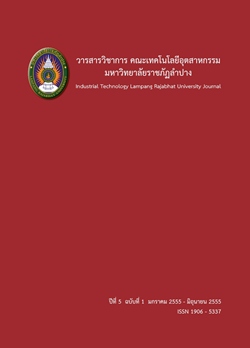กลยุทธ์การบริหารงานก่อสร้างตามหลักปรัชญาเศรษฐกิจพอเพียงของ องค์กรปกครองส่วนท้องถิ่นในจังหวัดเพชรบุรีและจังหวัดประจวบคีรีขันธ์
Keywords:
กลยุทธ์, การบริหารงานก่อสร้าง, เศรษฐกิจพอเพียง, Strategy, Contraction Management, Sufficiency EconomyAbstract
การวิจัยครั้งนี้มีวัตถุประสงค์เพื่อ 1) สร้างกลยุทธ์การบริหารงานก่อสร้างตามหลักปรัชญา เศรษฐกิจพอเพียง 2) ศึกษาระดับความคิดเห็นต่อกลยุทธ์การบริหารงานก่อสร้างตามหลักปรัชญา เศรษฐกิจพอเพียง 3) เปรียบเทียบระดับความคิดเห็นต่อกลยุทธ์การบริหารงานก่อสร้างตามหลัก ปรัชญาเศรษฐกิจพอเพียงจำแนกตามสถานภาพส่วนบุคคล และ 4) หาความสัมพันธ์ระหว่างระดับ ความคิดเห็นต่อกลยุทธ์การบริหารงานก่อสร้างตามหลักปรัชญาเศรษฐกิจพอเพียงกับสถานภาพส่วน บุคคล กลุ่มตัวอย่างที่ใช้ในการศึกษาครั้งนี้คือ บุคลากรด้านงานช่างขององค์กรปกครองส่วนท้องถิ่น ในจังหวัดเพชรบุรีและจังหวัดประจวบคีรีขันธ์ จำนวน 188 คนได้มาจากการสุ่มตัวอย่างแบบง่าย เครื่องมือที่ใช้ในการเก็บรวบรวมข้อมูลคือ แบบสอบถามมาตราส่วนประมาณค่า 5 ระดับ สถิติที่ใช้ ในการวิเคราะห์ข้อมูลได้แก่ ค่าเฉลี่ย ค่าร้อยละ ค่าเบี่ยงเบนมาตรฐาน การทดสอบไคสแควร์ และการทดสอบเอฟโดยทดสอบความแตกต่างรายคู่ด้วยวิธีเชฟเฟ
ผลการวิจัยพบว่า
1. กลยุทธ์การบริหารงานก่อสร้างที่ควรปฏิบัติ ประกอบด้วย 4 ด้านคือ ด้านบุคลากร ด้านงบประมาณ ด้านการจัดการ และด้านวัสดุอุปกรณ์ รวมทั้งหมด 79 ข้อ
2. ระดับความคิดเห็นต่อกลยุทธ์การบริหารงานก่อสร้างตามหลักปรัชญาเศรษฐกิจพอเพียง โดยรวมและรายด้านอยู่ในระดับมาก เรียงตามค่าเฉลี่ยคือ ด้านวัสดุอุปกรณ์ ด้านงบประมาณ ด้านการจัดการ และด้านบุคลากร ตามลำดับ
3. ระดับความคิดเห็นต่อกลยุทธ์การบริหารงานก่อสร้างตามหลักปรัชญาเศรษฐกิจพอเพียง โดยรวม จำแนกตามสถานภาพส่วนบุคคล แตกต่างกันอย่างมีนัยสำคัญทางสถิติที่ระดับ 0.05 4. ความสัมพันธ์ระหว่างระดับความคิดเห็นต่อกลยุทธ์การบริหารงานก่อสร้างตามหลัก ปรัชญาเศรษฐกิจพอเพียง จำแนกตามระดับการศึกษา และประสบการณ์การทำงานพบว่าโดยรวม มีความสัมพันธ์กันอย่างมีนัยสำคัญทางสถิติที่ระดับ 0.05 แต่เมื่อจำแนกตามตำแหน่งพบว่าโดยรวม ไม่มีความสัมพันธ์กัน
ข้อค้นพบจากการวิจัยคือ กลยุทธ์การบริหารงานก่อสร้างตามหลักปรัชญาเศรษฐกิจพอเพียง มี 4 ด้าน โดยมีข้อเสนอแนะดังนี้ การมอบหมายงานต้องคำนึงถึงความรู้ความสามารถ ตำแหน่ง และประสบการณ์ของบุคลากร มีการบริหารการใช้จ่ายเงินอย่างโปร่งใสตรวจสอบได้และมีเหตุมีผล มีการวางแผนการบริหารจัดการองค์กร และเลือกใช้วัสดุที่มีคุณภาพเหมาะสมกับงาน
The sufficiency economy philosophy in construction management of local administration organizations in Phetchaburi Province and Prachuap Khiri Khan Province
The purposes of the study were to 1) build a strategy for construction management in accordance with the sufficiency economy philosophy; 2) study opinions on construction management in accordance with the sufficiency economy philosophy; 3) compare opinions towards construction management in accordance with the sufficiency economy philosophy as classified by personal factors; 4) investigate the relationship between opinions towards construction management and personal factors. The participants were 188 officers selected by simple random sampling from local administration organizations in Phetchaburi Province and Prachuap Khiri Khan Province. The research tool was a 5-rating-scale questionnaire. The data were analyzed by means of means, percentage, standard deviation, chi-square test, F-test and Scheffé’s method.
The findings were as follows:
1. The strategy for construction management consists of personnel, budget, management and equipment with a total of 79 items.
2. The opinions towards construction management in accordance with the sufficiency economy philosophy were at high level both overall and with regard to each aspect.
3. The opinions when classified by personal factors were significantly different at the 0.05 level.
4. The relationship between opinions and personal factors when classified by educational background and work experience were significantly related at 0.05 level, while there was no relationship when classified by position. The research found four aspects in building strategies for construction management in accordance with the sufficiency economy philosophy. The research suggested that it was important to delegate work according to the staff knowledge and experience, to show transparency in budget spending, to have a management plan and to use equipment which was appropriate and suitable for the work.






